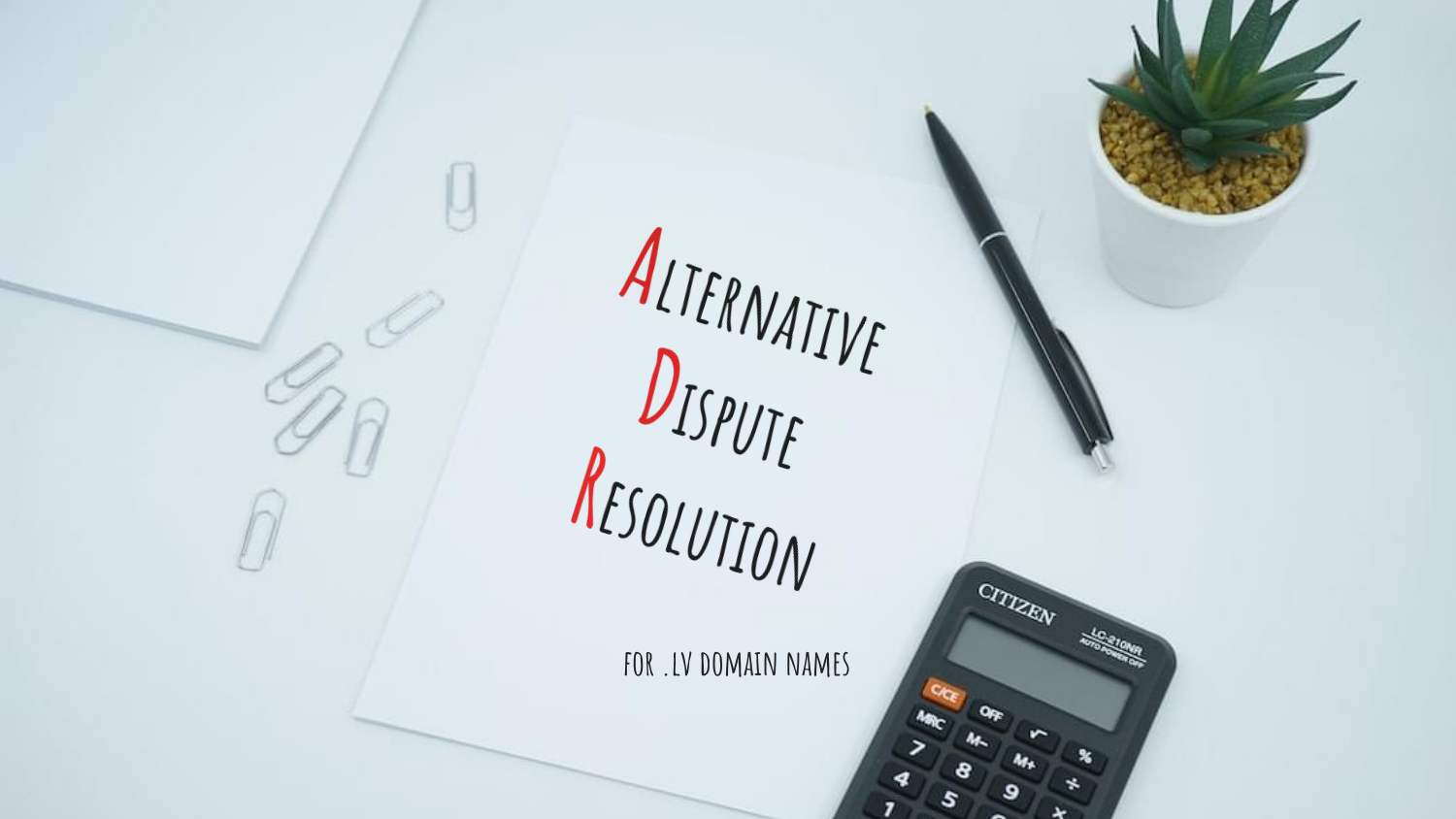- Cookies that enable provisioning of services you require.
- Cookies that inform NIC.LV about your visit on the website www.nic.lv - your consent is necessary for use of these cookies.

.LV domain name registration applications are processed in the order they are received, based on the basic principle of “first come, first served”. In this article, we discuss the out-of-court alternative dispute resolution (ADR) for domain names and how to employ it if a .LV domain name registration infringes your right to use the relevant designation.
Please note that the described out-of-court ADR procedure will be available once service provider(s) specialised in domain name and IPR disputes has (have) been approved, and the electronic dispute resolution system has been set up.
The domain name holder is obliged to comply with the domain name registration policy, which forms part of the Agreement on the Right to Use the Domain Name. When applying for the registration of a domain name, it must be ensured that the rights of a third party are not infringed or violated, such as the right of a trademark proprietor to register a domain name of an appropriate name.
A dispute may arise in situations where the domain name applicant has not ascertained the possible infringement or registers a domain name that infringes the rights of a third party in bad faith.
ADR is a structured process in which a neutral third party (expert) weighs the reasoning and evidence of the domain name holder and the complainant and then makes a binding decision. This decision is based on the evidence and the applicable rules.
Alternative dispute resolution is often used as a substitute for litigation to resolve a dispute in a time-saving manner.
Alternative dispute resolution offers a number of advantages over traditional litigation, including:
However, not all disputes can be settled by ADR.
Alternative dispute resolution can be employed for domain name disputes that meet each of the following three elements:
Alternative dispute resolution will be provided by a service provider approved by the .LV registry. The process of selecting a service provider is underway. Once the service provider has been approved, further information will be made available on the NIC website.
The service provider for ADR is expected to start providing the service in the first half of 2024.
The alternative dispute resolution service provider appoints experts. It is a duty of the service provider to ensure that only independent and impartial experts decide cases. The list of experts will be publicly available. In the event of a conflict of interest, the expert must recuse themselves from participating in the resolution of the relevant dispute.
The cost of alternative dispute resolution will consist of the dispute resolution fee set by the Service Provider. We will publish the Service Provider’s price list once the Service Provider has been approved.
Each party might incur additional costs if it seeks individual legal assistance and advice in dispute resolution.
The right to an effective remedy and the right to a fair trial are fundamental rights under Article 47 of the Charter of Fundamental Rights of the European Union. Therefore, the alternative dispute resolution procedure is not designed to replace judicial procedures and does not deprive parties of their right to seek judicial remedies. However, recourse to the courts might not suspend the ADR process.
The ADR procedure is initiated if the Service Provider receives a duly drafted complaint concerning a .LV registered domain name.
After the procedure has been initiated, the Registry applies a Dispute Lock to the domain name or names.
Dispute lock shall take the form of measures preventing any modification to the registrant or registrar information.
The domain name holder retains the right to renew the use of the domain name, and the Dispute Lock does not affect the DNS resolution of the domain name, i.e., the services associated with the domain name, e.g., website, e-mail address, continue to operate.
Following the Rules for the .LV Domain Name Dispute Resolution Policy, after the Dispute Lock is applied to the disputed domain name or names, the Service Provider informs the domain name holder whose use of the domain name or domain names is the subject of the complaint.
Please note that for a domain name holder to exercise his/her right to participate in the alternative dispute resolution procedure, it is essential to maintain an up-to-date e-mail address in the Registry. Communication between the parties and the Service Provider shall take place via e-mail.
If a domain name holder deems that they have a right to the domain name, they must submit the response and evidence to its rights of registration and use of the disputed domain name or names.
Please note that the ADR procedure will be resolved regardless of whether the holder of the disputed domain name responds to the complaint or not. The condition that a complaint may be resolved, even in the absence of a response from the domain name holder, is found in Paragraph 5.5 of the Rules.
Under the alternative dispute resolution procedure, the complainant may request:
The procedure also provides a settlement procedure where the parties agree on a resolution.
Complaints can be submitted after the alternative dispute resolution service provider starts providing the service.
Before submitting an ADR complaint, always read carefully:
Make sure that your complaint meets each of these three elements for alternative dispute resolution:
The complaint shall be made in accordance with Paragraph 3 of the Rules for the .LV Domain Name Dispute Resolution Policy.
Before submitting a response to the ADR procedure, always read carefully:
The domain name holder must respond to the statements and allegations contained in the complaint and include any and all bases for the the domain name holder to retain the registration and use of the rights of the disputed domain name(s).
The response to the complaint should be made in accordance with Paragraph 5 of the Rules for the .LV Domain Name Dispute Resolution Policy.